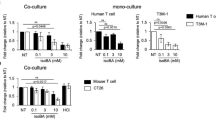Abstract
Glutamine represents the principal metabolicsubstrate for all rapidly proliferating cells. Sincepart of the glutamine efficacy could be related toimmunoregulating properties, we assessed the effects of orally administered glutamine on seruminterleukin-2 (IL-2) levels and intestinal T-cellpopulations in 48 athymic (nude) mice. Twenty-four micereceived a standard diet enriched by glutamine (added to drinking water at a 4% concentration), whilethe other 24 served as the control group and receivedthe same diet without glutamine. In glutaminefedanimals, we observed a marked increase in IL-2concentrations after 10 days of treatment in comparison withcontrol group and a modest but significant increase inintestinal T-cell counts. These results suggest thatoral glutamine is able to exert local and systemic immunostimulating activity that could be ofrelevance in the prevention of gut integrity and immunedefense loss associated, for example, with trauma,surgery, and starvation.
Similar content being viewed by others
REFERENCES
Alverdy JA, Aoys E, Weiss-Carrington P, Burke DA: The effect of glutamine enriched TPN on gut immune cellularity. J Surg Res 52:34 -38, 1992
Ardawi MSM, Newsholme EA: Metabolism in lymphocytes and its importance in the immune response. Essays Biochem 21:1-44, 1983
Askanazi J, Carpentier YA, Michesen CB, Elwin DH, Furst P, Kantrowitz R, Gump FE, Kinney JM: Muscle and plasma following injury. Ann Surg 191:78 -85, 1980
Stinnet JD, Alexander JW, Watanabe C, Macmillan BG, Fische r JE, Morris MJ, Trocki O, Miskell P, Edwards L, James H: Plasma and skeletal muscle amino acids following seve re burn injury in patients and expe rimental animals. Ann Surg 195:75-89, 1982
Roth E, Funovics J, Muhbacher F, Schemper M, Mauritz W, Sporn P, Fritsch A: Metabolic disorders in severe abdomina sepsis: glutamine deficiency in skeletal muscle. Clin Nutr 1:25- 41, 1982
Brandtzaeg P, Halstensen TS, Kett K, Krajci P, Kvale D, Rogmun TO, Scott H, Sollid M: Immunobiology and immunopathology of human gut mucosa: Humoral immunity and intraepithelial lymphocytes. Gastroenterology 97:1562-1590, 1989
Falini B, Taylor CR: New deve lopments in immunoperoxidase techniques and their application. Arch Pathol Lab Med 107:105-111, 1983
Reitzer LJ, Wice BM, Kennell D: Evidence that glutamine, not sugar, is the major energy source for cultured HeLa cells. J Biol Chem 254:2669 -2676, 1979
Newsholme P, Gordon S, Newsholme EA: Rates of utilisation and fates of glucose, glutamine, pyruvate, fatty acids and ketone bodies by mouse macrophages. Biochem J 242:631-636, 1987
Calder PC, Newsholme EA: Glutamine promotes interleukin-2 production by concanavain A-stimulated lymphocytes. Proc Nutr Soc 51:105A, 1992
Rights and permissions
About this article
Cite this article
Gismondo, M., Drago, L., Fassina, M.C. et al. Immunostimulating Effect of Oral Glutamine. Dig Dis Sci 43, 1752–1754 (1998). https://doi.org/10.1023/A:1018883603429
Issue Date:
DOI: https://doi.org/10.1023/A:1018883603429




